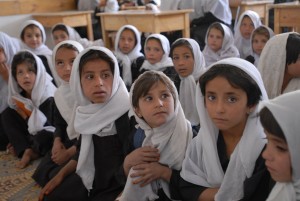An international, nongovernmental humanitarian organization established in 1945, CARE (Cooperative for Assistance and Relief Everywhere) assists individuals and families in communities most in need around the world in order to overcome global poverty and social injustice. CARE operates programs across a broad spectrum of areas, ranging from emergency aid and hunger relief to education and health care. Committed to providing beneficiaries with the necessary resources to achieve sustainable, positive change, CARE implements solutions that generate economic opportunity and increase self-sufficiency. In 2014, CARE supported 880 projects that helped 72 million people in 90 countries, including Afghanistan.
 CARE, which initially entered Afghanistan in 1961, has a long history in the country. For many years, CARE delivered assistance to the people of Afghanistan without interruption. With the outbreak of the Soviet-Afghan War in 1979, however, the organization had to temporarily cease its activities in Afghanistan until the conflict ended in 1989. Subsequently, CARE recommenced operations in Afghanistan from a cross-border office in Peshawar, Pakistan, which remained its base in the region for over a decade. From 2002 onward, CARE’s Afghanistan mission has maintained its headquarters in the nation’s capital, Kabul.
CARE, which initially entered Afghanistan in 1961, has a long history in the country. For many years, CARE delivered assistance to the people of Afghanistan without interruption. With the outbreak of the Soviet-Afghan War in 1979, however, the organization had to temporarily cease its activities in Afghanistan until the conflict ended in 1989. Subsequently, CARE recommenced operations in Afghanistan from a cross-border office in Peshawar, Pakistan, which remained its base in the region for over a decade. From 2002 onward, CARE’s Afghanistan mission has maintained its headquarters in the nation’s capital, Kabul.
By 2010, CARE Afghanistan was facilitating programs that benefitted over 1.5 million people throughout the country. All of the organization’s programs concentrate on developing the capacity of Afghan communities to provide for their own needs. Through the process of building local self-reliance, CARE works with residents to advance socioeconomic equality, secure fundamental human rights, and establish good governance of public institutions. CARE also campaigns with Afghans from disadvantaged, marginal populations for national and international policy measures that safeguard their interests and optimize their chances of attaining economic stability. Much of CARE’s current programming in Afghanistan centers on three key areas: rural development, education, emergency response, and rehabilitation.
Helping Rural Communities Organize Their Own Development
As one of 31 facilitating partners for Afghanistan’s National Solidarity Program (NSP), CARE helps rural Afghan communities to build effective institutions of local governance and improve their capability to initiate, administer, and plan their own development projects. The Ministry of Rural Rehabilitation and Development introduced the NSP in 2003, and the program has effectively supported good governance at the local level by enabling communities all across Afghanistan to democratically elect representatives to voluntary Community Development Councils (CDC’s).
During the first seven years following the creation of the NSP, CARE spurred independent development in 1,670 Afghan communities by providing local grants and enabling the fair election of CDC’s. CARE teaches the members of CDC’s technical skills and trains them to maintain public accountability, manage finances, and procure resources. To complement the training of CDC members, NSP facilitating partners like CARE offer assistance in the preparation of Community Development Plans and the execution of their constituent subprojects. From the construction of roads and schools to the installation of irrigation systems, CARE has helped to empower community residents to affect self-determined changes in their own lives by assisting close to 3,000 community subprojects. Through material and technical support, CARE also strives to rejuvenate agricultural activity in Afghanistan’s rural regions. CARE distributes vouchers to farmers of limited means that can used to acquire essential supplies, including fertilizer, seed, and tools.
Supporting Community-Based Education
 Acknowledged as one of the foremost organizations driving community-based education in Afghanistan, CARE has been involved in educational initiatives in the country for over two decades, beginning with a pilot program in Khost in 1994. CARE now operates educational programs directly or through partners in 15 provinces, and it engages in a diverse array of associated activities that includes setting up libraries, building schools, training teachers, and guarding against potential attacks on vulnerable schools and students.
Acknowledged as one of the foremost organizations driving community-based education in Afghanistan, CARE has been involved in educational initiatives in the country for over two decades, beginning with a pilot program in Khost in 1994. CARE now operates educational programs directly or through partners in 15 provinces, and it engages in a diverse array of associated activities that includes setting up libraries, building schools, training teachers, and guarding against potential attacks on vulnerable schools and students.
From 2006 through 2011, CARE led a cooperative group of four nongovernmental organizations responsible for the implementation of the Partnership for Advancing Community Education in Afghanistan (PACE-A) project. A collaboration between USAID and Afghanistan’s Ministry of Education, PACE-A sought to improve access to basic education for 90,000 children, young people, and adults living in 1,000 remote regions of the country where no government-administered schools exist. CARE and its implementation partners facilitated community-based education in these isolated areas by recruiting local residents to train as teachers and arranging with community members to set up elementary schools in available public spaces. In collaboration with the Ministry of Education, CARE also helped to devise a robust curriculum and instructional guidelines on which to ground the community-based education courses.
Responding to Emergencies and Rehabilitating Populations on Society’s Margins
When natural disasters or human-created crises impact Afghan communities, CARE provides immediate emergency aid, followed by long-term assistance throughout the process of rebuilding and rehabilitation. CARE also undertakes risk reduction actions in vulnerable communities and helps to put in place emergency preparedness plans to diminish the harm caused by prospective future calamities. Among its recent emergency response efforts, CARE delivered tents, hygiene kits, blankets, solar lamps, cooking sets, and other vital supplies to 98 homes in areas of central Afghanistan affected by the 7.5 magnitude Hindu Kush earthquake on October 26, 2015.
In addition to its emergency relief and preparedness efforts, CARE provides shelter and social services for refugees who have returned to Afghanistan from Iran or Pakistan. Since 2009, CARE has operated extensive reintegration programs for returnees living in Kabul and settlements surrounding the city. Along with offering secure housing and essential services, these programs concentrate on helping returnees to obtain vocational positions and build frameworks for self-governance of their settlements.
Also in Kabul, CARE began operating a hunger relief program in 2009 that helps 50,000 households to achieve food security through income-earning occupational opportunities. Program participants contribute to the maintenance of Kabul’s public spaces by performing such necessary environmental services work as park rehabilitation, road graveling, and the removal of solid waste from streets.

